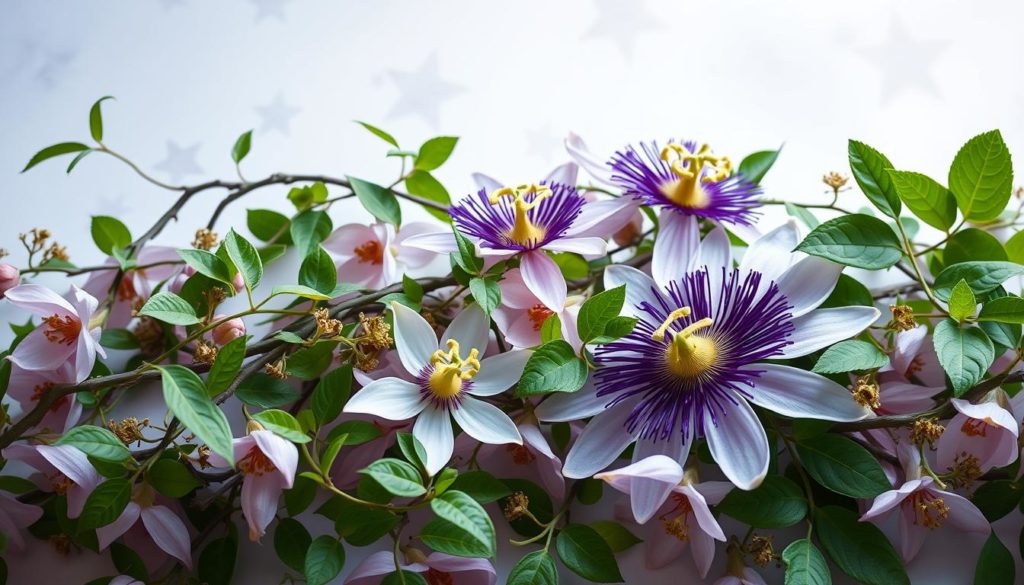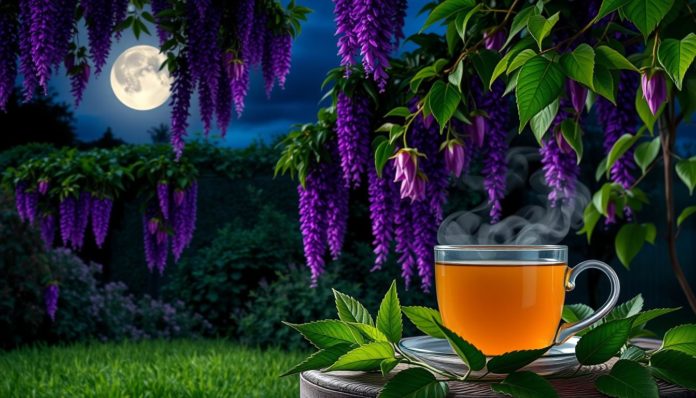Did you know nearly 70 million Americans struggle with sleep issues and anxiety? This fact highlights the need for safe, natural remedies. Passionflower is one such herb known for aiding sleep and reducing anxiety. It has been used for centuries but is now gaining attention for its calming effects. Let’s dive into why Passionflower is becoming a favorite for promoting peaceful sleep and calmness.
Introduction to Passionflower and Its History
Passionflower is both fascinating and lovely. It is known for its calming abilities and many uses. Its journey from ancient civilizations to today has caught the eye of many. Herbalists and researchers have looked into its possible benefits. This shows how important it is in traditional healing.

The Origin of Passionflower
The passionflower comes from tropical and subtropical areas of the Americas. Spanish explorers found it in the 16th century. The name “passionflower” is based on its unique flowers. They saw its petals as a symbol of Jesus Christ’s crucifixion. This plant’s look was seen as reflecting Christ’s passion and pain.
Historical Uses in Traditional Medicine
Passionflower has been a part of healing practices for centuries. Its calming effects made it popular. Native Americans first used it for different medical issues. They treated wounds, liver problems, and more. The Cherokee made a tea for relaxation, and the Aztecs used it to calm.
In Europe, it became known as a sleep and anxiety aid. Many herbalists wrote about it back then. Nowadays, as people seek natural health options, passionflower is still valued. It is appreciated for its calming effects in the world of medicinal herbs and remedies.
| Historical Use | Culture | Ailments Treated |
|---|---|---|
| Tea Brew | Cherokee | Insomnia, Anxiety |
| Sedative | Aztecs | Calmness, Nerve Issues |
| Topical Application | Native American Tribes | Wounds, Boils |
How Passionflower Helps with Sleep
Passionflower is known as a strong natural remedy for sleep. This is due to its history and science backing. It has flavonoids, alkaloids, and GABA modulators. These all help improve how well we sleep.

Mechanisms Promoting Sleep
Passionflower helps you sleep by working with GABA, a brain chemical. This chemical makes brain activity less intense, which helps you relax and fall asleep. The compounds in Passionflower boost this calming effect. This makes moving into sleep easier.
Scientific Studies on Sleep Benefits
Several research studies have looked at how well Passionflower aids sleep. One study in the Journal of Clinical Pharmacy and Therapeutics showed positive outcomes. People taking a Passionflower supplement said they slept better. They could fall asleep quicker and their sleep was deeper.
Another study compared Passionflower tea to a placebo. It proved that Passionflower is an effective sleep aid. Users experienced less waking up at night and enjoyed better sleep overall.
| Study | Methodology | Findings |
|---|---|---|
| Journal of Clinical Pharmacy and Therapeutics | Passionflower supplement | Significant sleep improvement |
| Comparative Study on Passionflower Tea | Passionflower tea vs. placebo | Reduced wakefulness, better sleep quality |
The Role of Passionflower in Reducing Anxiety
Passionflower helps in dealing with anxiety, offering a natural way to manage stress. It has calming effects on the nervous system. This helps improve mental well-being.
Calming Effects on the Nervous System
Passionflower works by boosting GABA levels in the brain. GABA is a neurotransmitter that calms nerve cells. This is key for stress relief and lowering anxiety.
Clinical Evidence Supporting Anxiety Relief
Many studies prove Passionflower’s effectiveness in anxiety reduction. A study in the “Journal of Clinical Pharmacy and Therapeutics” showed patients using Passionflower felt much better. Their anxiety levels dropped more than those taking a placebo. This highlights Passionflower as a strong natural anxiety cure.
| Clinical Study | Outcome |
|---|---|
| Journal of Clinical Pharmacy and Therapeutics | Significant reduction in anxiety levels |
| Phytotherapy Research | Improved mood and decreased stress |
| Complementary Therapies in Medicine | Effective in managing symptoms of generalized anxiety disorder |
Exploring the Different Forms of Passionflower Supplements
Passionflower helps with relaxation and eases anxiety. It comes in various forms, suiting a range of preferences and lifestyles. Knowing the benefits of each can help you pick the right one for you.
Passionflower Tea
Passionflower tea is great for those who love brewing a warm drink. To make Passionflower tea, you steep dried leaves and flowers in hot water. This releases its calming properties gently, perfect for a restful night’s sleep.
Passionflower Extract and Tinctures
Passionflower extract and tinctures are concentrated, offering quick relief. Easy to mix with water or juice, they’re loved for their convenience. They also make adjusting doses straightforward, ideal for those needing specific amounts of passionflower.
Capsules and Tablets
Herbal supplements like capsules and tablets save time. No need to prepare anything, making daily intake simple. They provide consistent doses, perfect for those always moving.
Every form of passionflower supplement has its benefits, fitting various preferences and needs. Whether it’s Passionflower tea for a calming night, Passionflower extract for fast relief, or capsules for ease, adding passionflower to your routine is simple.
How to Incorporate Passionflower into Your Routine
Adding passionflower to your day can help a lot. It’s good for sleep, easing anxiety, or just as part of your herbal regimen. Think about when and how it fits with your other habits and supplements.
Passionflower tea is a great way to start the day. A cup in the morning can make you feel calm. Drinking it at night helps you relax and sleep better.
If you like things easy, try capsules or tablets. They fit simply into your daily routine. But, keep an eye on how much you take. Usually, 250mg to 500mg a day works, depending on what you need and can handle.
Mixing passionflower with other herbal regimen parts boosts its effect. For example, adding chamomile or valerian root at bedtime can make you even calmer.
| Time of Day | Form | Purpose |
|---|---|---|
| Morning | Tea | Start the day calmly |
| Afternoon | Capsules/Tablets | Maintain calm focus |
| Evening | Tea or Tincture | Unwind before bed |
Use passionflower regularly for the best outcome. Watch how much you use and how it works over a few weeks. Adding things like yoga or meditation can make its benefits in your life even bigger.
Understanding the Proper Passionflower Dosage
It’s important to know the right Passionflower dosage for the best results and safety. The right amount can change depending on if you need better sleep or to ease anxiety.
Recommended Dosage for Sleep
To improve sleep with Passionflower, start with a small dose and slowly increase it. Here are the herbal dosage recommendations:
- Passionflower tea: 1 to 2 cups before bedtime.
- Capsules or tablets: 250 to 500 mg around 30 minutes before sleeping.
- Tincture: 30 to 40 drops in water taken at night.
Dosage Guidelines for Anxiety
For easing anxiety, the recommended supplement dosage for Passionflower varies with the form:
- Passionflower tea: 1 to 3 cups during the day.
- Capsules or tablets: 200 to 400 mg, in 2 or 3 doses.
- Tincture: 10 to 30 drops in water, two to three times a day.
| Form | Dosage for Sleep | Dosage for Anxiety |
|---|---|---|
| Tea | 1-2 cups before bedtime | 1-3 cups throughout the day |
| Capsules/Tablets | 250-500 mg before sleeping | 200-400 mg, divided doses |
| Tincture | 30-40 drops at night | 10-30 drops, 2-3 times daily |
Before starting Passionflower, talk to a healthcare provider. They will make sure it’s safe and right for your health needs.
Possible Side Effects and Precautions
Passionflower is popular for reducing anxiety and supporting better sleep. But it’s key to know its possible side effects and safety advice. While it helps many people, some should be careful with it.
Who Should Avoid Passionflower?
Not everyone should take Passionflower. For instance, pregnant and breastfeeding women should stay away from it. The risk for these groups isn’t fully known. Also, people on certain medications, like lorazepam, need to be careful. This is because of possible drug interactions noted in research studies.
Common Side Effects
Passionflower may have side effects for some users. Common ones are feeling dizzy, sleepy, and confused. There are also rare, serious side effects like vasculitis. It’s vital to understand these risks and follow safety advice closely.
The Passionflower Plant: What You Need to Know
The Passionflower plant is famous for its stunning flowers. We explore its features and offer advice for those wanting to grow it. If you’re interested in its health benefits or love how it looks, check out this botanical information.
Botanical Characteristics
The Passionflower plant loves well-draining soil and needs sunlight but also some shade. Its flowers are amazing with unique patterns and bright colors. It’s part of the Passiflora genus and climbs using supports. The fruit it bears is not only good-looking but also healthy.
Growing Passionflower at Home
Growing the Passionflower plant at home can be very fulfilling. It’s easy if you know how. The soil must drain well and be somewhat fertile. Start your Passionflower with cuttings, layering, or seeds.
Water it well and fertilize sometimes. This will make your plant grow strong.
- Plant in a sunny spot with partial shade.
- Use well-draining soil, enriched with organic matter.
- Water regularly, but avoid waterlogging the soil.
- Support the plant with a trellis or fence for optimal growth.
- Monitor for pests and treat with organic insecticides if necessary.
- Prune to encourage healthy growth and flowering.
Follow these tips, and your Passionflower plant will flourish. Enjoy the peace and beauty it brings to your garden!
Combining Passionflower with Other Natural Remedies
Adding other natural remedies to Passionflower can boost its calming effects. The idea is that some herbs work better together than alone. This part will look at how Valerian Root and Chamomile can enhance Passionflower’s effects on sleep and anxiety.
Synergistic Effects with Valerian Root
Valerian Root is often combined with Passionflower for better relaxation and sleep. Research shows that this Passionflower combination can create a strong herbal synergy. The sedative effects of Valerian Root may work with Passionflower for a deeper calm.
Together, they could offer better anxiety relief than either herb by itself.
Benefits of Combining with Chamomile
Chamomile is another herb known for its calming and anti-anxiety effects. When it’s mixed with Passionflower, the result can be very effective. This Passionflower combination might lead to deeper sleep and more stable moods.
Recent studies show Chamomile’s calming effects work well with Passionflower. This mix is a strong choice for natural anxiety relief.
Where to Buy High-Quality Passionflower Products
When looking for top-notch Passionflower products, choose a trusted supplier. Find ones known for pure, powerful herbal supplements. Look for product details like active ingredient levels to ensure health benefits. Check certifications like USDA Organic or Non-GMO for product quality and safety.
High-quality Passionflower can be verified through third-party testing results, shared by reliable suppliers. This proves the product is not only effective but also safe from harmful stuff. Reading customer reviews also helps gauge both the product’s benefits and the supplier’s credibility.
In the U.S., find these products at stores like Whole Foods Market, or online at Amazon. Here, a wide range of reviews can help. Always buy from brands committed to good manufacturing practices and clear labeling. This ensures you get the most out of this amazing herb.
FAQ
What are the benefits of Passionflower for sleep?
Passionflower is known to calm your mind. It’s used to help you sleep better. This makes it a top pick for beating insomnia.
How does Passionflower help with anxiety?
Passionflower can soothe your nervous system. This helps lower your anxiety symptoms. It works by calming the mind, which is great for anxiety relief.
What forms of Passionflower supplements are available?
Passionflower comes in tea, extracts, tinctures, and pills. Each type has its own benefits. Tea is soothing, while extracts offer strong doses. Pills are easy for daily use.
How should I incorporate Passionflower into my daily routine?
To use Passionflower effectively, take it when it benefits you most. For sleep, try it at night. For calming anxiety, use it in the morning or when needed. Always start with low doses and check with a doctor.
What is the recommended dosage of Passionflower for sleep?
The advised amount for sleep is 250 to 500 mg daily. Begin with a small dose to see how you react. Adjust following expert advice.
Are there any side effects of using Passionflower?
Although mostly safe, Passionflower might cause dizziness or upset stomach in some. Use it as directed and talk to a doctor if you’re on other meds.
Who should avoid using Passionflower?
Pregnant women, those with liver issues, and people on certain meds should avoid it. Always check for drug interactions.
What do I need to know about the Passionflower plant?
Passionflower is unique and climbs. It loves sun and well-drained soil. With the right care, you can grow it at home.
Can I combine Passionflower with other natural remedies?
Yes, mix it with Valerian Root or Chamomile for better results. This helps more with sleep and anxiety. But talk to a healthcare provider first.
Where can I buy high-quality Passionflower products?
You can find quality Passionflower products at health stores or online. Look for certifications and read reviews to choose the best.


